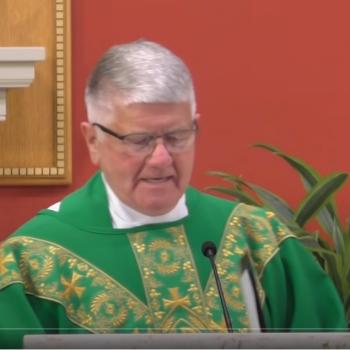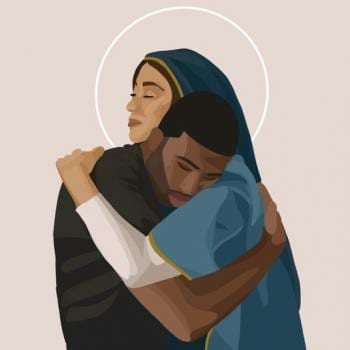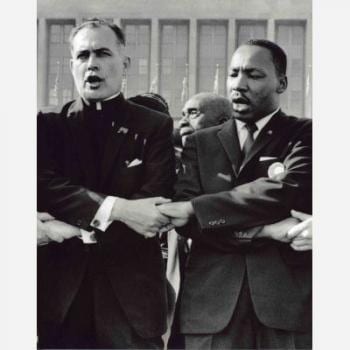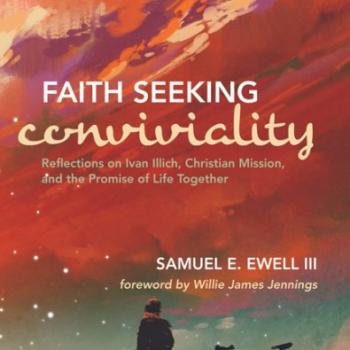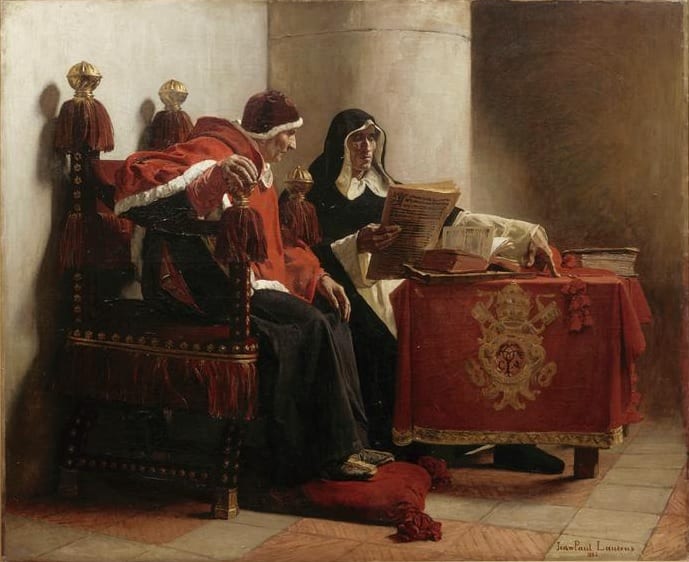
[This is a guest post from Matthew Cooper, who blogs at the Heavy Anglo-Orthodox.]
Readers of my blog are by now probably well familiar with my rejection of intégrisme, the political philosophy which holds a belief that spiritual institutions must vie for and possess temporal political power. My point of view is largely as follows.
First of all, the very roots of intégrisme are agnostic. They avow respect for religious institutions not because they share the basic epistemological and value-oriented beliefs propounded by those institutions, but merely because those institutions are useful for producing and maintaining the sort of society they want to uphold. Charles Maurras was to the last breath a devoted follower, not of Christ the King, but of Comte and Durkheim: he supported the Catholic Church, not because he was Catholic or believed in God — but because he saw the effects of the Catholic Church on French social solidarity and valued those effects.
Of course, I also thoroughly detest some of the outcomes of intégriste thinking as well. There is, for one thing, the anti-Semitism. Maurras was an anti-Dreyfusard, for reasons which were wholly bigoted. And then of course there is that horrid little penchant for mindless violence on the part of intégriste political formations, like that of the Franco government or that visited on Sabra and Shatila by the Maronite adherents to the intégriste ideals of Bachir Gemayel and his Falange. This should be consideration enough to ward most decent folk away. As I put it before:
The “moral genealogy” of intégrisme matters, because the one true point about the liberal compromise on matters of religion is that it doesem> stave off, temporarily, the more substantive question of what takes its place. That question does indeed seem an ominous one, in no small part because those of us who have been steeped in liberalism’s self-written mythology are the ones who must bring forth what replaces it. For those of us who are critics of liberalism, that should scare us.
But, though I have made it often enough, this is really a surface-level objection. The biggest problem I have with intégrisme is Dostoevskian: in seeking the outcomes and utility associated with religious belief, they are willing to adopt the attitude and fundamental orientation to life that is expressed in the Legend (and character) of the Grand Inquisitor. Let us consider, not the particular political structures that were associated with intégrisme, which themselves were contingent on the political exigencies of their time. Let’s look instead at the fundamental principles of intégrisme as they are expressed by the Josias “in three sentences.”
Integralism is a tradition of thought that rejects the liberal separation of politics from concern with the end of human life, holding that political rule must order man to his final goal. Since, however, man has both a temporal and an eternal end, integralism holds that there are two powers that rule him: a temporal power and a spiritual power. And since man’s temporal end is subordinated to his eternal end the temporal power must be subordinated to the spiritual power.
Because my politics are post-liberal and Christian socialist, there is a lot here that I can notionally agree with. Like les intégristes, I also reject the idea that politics can ever be satisfactorily disentangled from the question of ultimate ends; and it follows that I also accept the idea that temporal and ultimate ends are distinct and can be treated distinctly by – let’s call them what they are — Church and state.
But it’s the third point where my Dostoevskian objection comes into play fully. Keep in mind as we proceed, gentle readers, that Dostoevsky is not a liberal in any sense, but instead someone between a Slavophil and a conservative Christian socialist. If there was any doubt of that, go and read Crime and Punishment. To make the point, though: the final temptation of Christ by the Devil in the Gospel of Saint Matthew (all three of which temptations play such a significant rôle in Dostoevsky’s Legend, as “evidence for the prosecution” ) was that “all the kingdoms of the world, and the glory of them” would be given to Christ, “if thou wilt fall down, and worship me.” Whatever else did the Devil tempt Christ with, if not “the temporal power … subordinated to the spiritual power”? And look: this is how the Grand Inquisitor seeks to incriminate Jesus in the Legend:
Thou couldst accept the glaive of Caesar Thyself; why didst Thou reject the offer? By accepting from the powerful spirit his third offer Thou would have realised every aspiration man seeketh for himself on earth; man would have found a constant object for worship; one to deliver his conscience up to, and one that should unite all together into one common and harmonious ant-hill; for an innate necessity for universal union constitutes the third and final affliction of mankind. Humanity as a whole has ever aspired to unite itself universally. Many were, the great nations with great histories, but the greater they were, the more unhappy they felt, as they felt the stronger necessity of a universal union among men. Great conquerors, like Timoor and Tchengis-Khan, passed like a cyclone upon the face of the earth in their efforts to conquer the universe, but even they, albeit unconsciously, expressed the same aspiration towards universal and common union. In accepting the kingdom of the world and Caesar’s purple, one would found a universal kingdom and secure to mankind eternal peace. And who can rule mankind better than those who have possessed themselves of man’s conscience, and hold in their hand man’s daily bread?
Again: what desire is the Grand Inquisitor here giving voice to, but the desire of les intégristes? To wit, that the temporal power — the glaive of Cæsar — be placed in the hands of the spiritual power, the better to order the æternal ends of mankind? The Grand Inquisitor fancies that he is able and willing to complete the work of Christ, but without Christ: for him, Christ Himself only gets in the way of fulfilling the Kingdom of Heaven on earth. Dostoevsky, it must be remembered, was a Russian contemporary of Maurras. He was well acquainted with the psychology of his contemporaries in Western Europe, and by placing the Legend of the Grand Inquisitor in the mouth of Ivan Karamazov, it’s clear he meant the tale to serve as a parable for contemporary realities and the “present problems” of the Karamazov family in the novel.
And look what we find in the “three sentences” intégrisme of the Josias. Or rather, more tellingly, what we don’t find. The “spiritual end” of man is kept deliberately coy and vague: there is no mention of Christ or even of God. Why not? If this spiritual end is so all-important, why should not as much attention be paid to the nature of that end? Why such laser-focus on the nature of the ordering of the supposedly-subordinate “temporal end” through the proper hierarchical structuring of the powers that is supposed to get us there? Let us be kind to the intégristes of the Josias and assume, for their sake, that what they mean by the “spiritual end” of man is the standard Christian narrative of salvation from sin and death, as completed in Christ. And let us also grant the intégristes this, partly because I agree with them completely on it: that the arrangement and structuring of our this-worldly political life has a qualitative impact on our salvation. That is to say: what we do on this earth matters in the ultimate question of how we are saved.
Even so: what grounds are there for assuming that the temporal end and this æternal end, the temporal power and this particular spiritual power, are commensurate? That is to say, even if the æternal end should concern us more, as I firmly believe it does and should — why does it follow that the temporal power must be subordinated to the spiritual power, as though the concerns of the two kinds of “ends” were merely differentiated by degree rather than by qualitative substance? The Grand Inquisitor constantly speaks of the difficulties and delays and setbacks posed in bringing about the Kingdom of Heaven on earth, that were encountered by Christ’s refusal to be tempted by the Devil’s offerings of miracle, mystery and authority. But what is a “delay” or a “setback” when seen from the standpoint of æternity, of everlasting life? There is a qualitative difference, not merely a quantitative one, that Dostoevsky — or Ivan Karamazov, rather — wants us to see and take note of between the Grand Inquisitor and Christ. Christ desires that the person in her full capacities come to a realisation of her ultimate end: not that it should be delivered to her from atop a harmonious ant-hill.
For this reason more than for any other, I tend to see the political project of intégrisme as, not merely non-theological (which is the most that can be summoned against Maurras and his functionalism), but in a foundational sense anti-theological. Even if we take it as read that the “spiritual end” les intégristes refer to is the Christian version of the End, the third sentence nevertheless posits a quantitative equation between temporal and spiritual ends which sees only a difference of degree — leading to the frustrations of the Grand Inquisitor — rather than a difference in kind. Consider Jesus Christ’s answer to Pilate in the Gospel of Saint John, at His trial before the “temporal power” of his own day: “My kingdom is not of this world: if my kingdom were of this world, then would my servants fight, that I should not be delivered to the Jews: but now is my kingdom not from hence.” Even at the very moment of truth when the temporal powers and spiritual authorities conspired together to kill Christ — He would not fight in kind, but instead sought to conquer death by His death. He did not seek to subordinate Pilate or the Jews. He sought to transform them. His power was completely different in kind than Pilate’s.
Despite my invocations of Dostoevsky, please do not consider this to be an Orthodox polemic against Catholicism, even in an attenuated form. I do firmly believe that the Roman Catholic candidate for sainthood Dorothy Day would have had the same objections to intégrisme that I do, she being far better-versed than I am in Russian political thought and literature, and a Christian anarchist to boot. There were and are other, healthier “options” in the grand world of Western theopolitical thought, even options which are illiberal or post-liberal. I offer the Catholic Worker idea of Dorothy Day and Peter Maurin as one particularly luminous exemplary “option.”
Also, if I seem overly harsh on the intégristes, it must be borne in mind that the very same problems of political life that deeply concern them — proportionality, equity, hierarchy of values, the orientation of human life toward the transcendent moral order of the cosmos — all deeply concern me as well. In that sense, I am two steps (two sentences?) closer to the intégristes than I am to the liberals. But precisely on account of that closeness I believe the divisions and distinctions must be made that much more exact. The stakes are indeed quite high.








